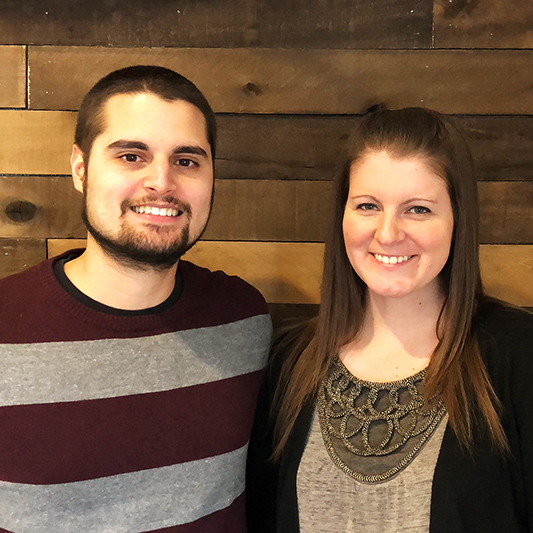1st Corinthians 16:13 says, “Be on your guard; stand firm in the faith; be courageous; be strong.”
It is important for Christians to not only take this verse to heart, but to live it out in their everyday lives. For some believers in the world, courage is required daily to survive. For others, being brave is simply trusting God’s faithfulness and following His path.
Alumni Ryan and Courtney became an example of this lionhearted faith when they moved to Colorado Springs to start a unique ministry within the walls of their home.
Hosting church services in their home wasn’t what the Ragozines had originally planned. After being at seminary in Kentucky, Ryan Ragozine felt convicted to live out his faith in a more social and relational way.

“The goal after SAGU was I was going to go on and do a Master's degree in Theology, and then I wanted to become a professor and teach theology. At some point in seminary, I felt God kind of leading me away from the academy and calling me into more practical ministry,” he says.
A Relational Church
Both Ryan and Courtney always cared deeply about being hospitable—being personable—with people. So, the house church approach seemed like a great idea to build close relationships with nonbelievers and believers alike.
“Today in our society, there are a lot of people who are leery of the church. There are a lot of people who might be hostile towards the church. So we were thinking in terms of ministry. How can we kind of break down some of those barriers and some of those obstacles?"
One of the ways to do that was through Christian hospitality and by creating a warm and welcoming environment in their home. Rather than meeting in a church building, the Ragozines host a group in their house with a shared meal, fellowship and Bible study.
“We try and create an environment that's very welcoming and inviting and comfortable,” he says. “Our church...is a church for all people; the church for churchgoers and non-churchgoers, for those who grew up in the church, for those who did not. And we feel like we are uniquely suited to do that kind of ministry because we meet in a home, because it's a very comfortable environment, and because we are very relational.”
They also lead volunteer activities once a month. Even the people who don’t attend the church Monday night show up for these events. Ragozine says that it’s a great way for their church to connect with others in the community.
"“It's a ministry that revolves around hospitality...the friendships in our church go far beyond meeting just once a week.”
During his teenage years, Ryan fell away from his faith and became agnostic despite growing up in the church. Around the age of twenty, he abandoned his agnosticism and turned back to God. Ryan believes that that faith experience allows him to connect to the non-believers and engage with them on a more personal level.
“I can relate to a lot of the things that I think non-church people feel, and I can relate to their questions and even their distress sometimes in relation to certain themes in the Bible that are difficult,” he says.
Biblically Driven
Though this approach to ministry is great when it comes to building authentic relationships with people who aren’t Christians, it can also be challenging. In terms of teaching the Bible on Monday nights, Ragozine says that it isn’t always easy to present the gospel in a clear way.
“In a ministry that is not only for church goers but for non-church goers as well, there will always be a temptation to skip over tough passages or ignore difficult themes in Scripture; the idea of sweeping counter-cultural and potentially offensive biblical concepts under the rug can be attractive at times,” he says.
However, he tries to convey the gospel in a way that will allow people to discuss, engage, and think it through. For almost two years, the group has been going through the Gospel of Matthew, verse by verse, and passage by passage. Ragozine says that by going through a book in this manner, he is forced to teach what’s in front of him, even if it’s uncomfortable.
“This is certainly not the easiest thing in the world to do, but Christ doesn't necessarily call us to a life of comfort or ease, but he summons us to carry our cross and follow him. We are trying our best to do that."
Trust over Numbers
Another challenge the couple faces in their ministry is the steady but slow growth of their church.
"Unlike more traditional, brick-and-mortar churches, [it’s] not the kind of ministry that grows through marketing or advertising; all the people who attend do so because of previously formed relationships,” Ragozine says.
“For us, it takes a long time to grow because we have to build these relationships and friendships over time, and that's the way we grow.”
This kind of challenge can seem daunting, but the Ragozines take heart in sharing the gospel in a nontraditional way.
“In a ministry like this…your faith is tested all the time. I think you are constantly put in a position where you have to just rely on God and trust Him,” Ragozine says.
Ragozine graduated from SAGU in 2010 with a Bachelor’s degree in Theology. He says his time at SAGU was able to help him with his spiritual growth and prepare him for ministry. One professor that greatly impacted him was Dr. Rosdahl.
“Dr. Rosdahl…was someone who influenced me very strongly and was a mentor for me. He’s someone who really helped me learn…really helped with my theological development,” he says.
While at SAGU, Ragozine was president of a group called the Forum, an open forum headed by Dr. Rosdahl where students could discuss philosophical and theological issues. He says that this experience at SAGU was formative.
“The idea was, with this forum, we are trying to cultivate an environment where people feel free and safe to express their doubts and their questions and their concerns and to talk about theological issues. And that's the kind of environment we try to create on Monday nights,” Ragozine says.
Presently, the Ragozines host one service on Monday nights for people to gather and spend time together. Their vision is to multiply and extend to multiple gatherings.
